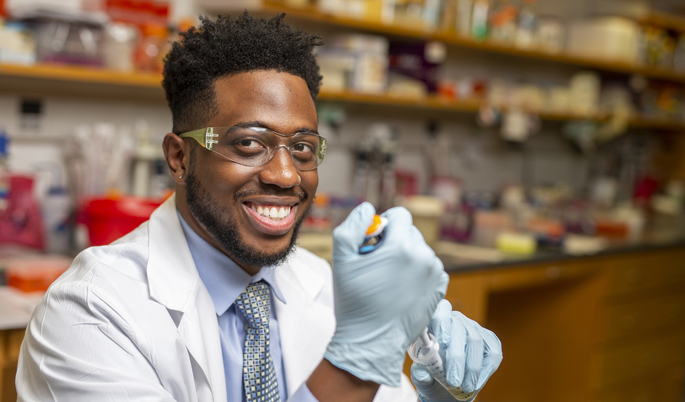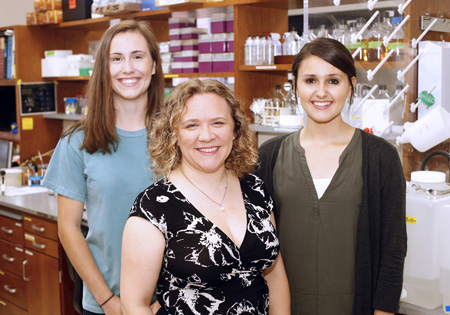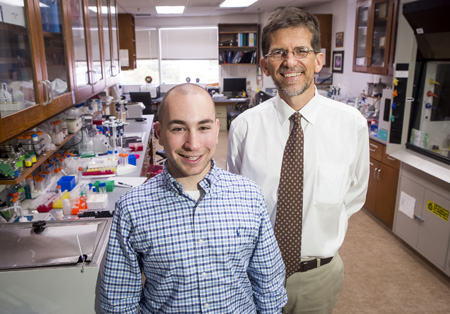
Since it began 16 years ago, the Vanderbilt Summer Science Academy (VSSA) has provided research experiences for roughly 2,000 undergraduates from colleges around the country. Nearly half are members of under-represented minority groups; many are the first in their families to pursue graduate or medical degrees.
Hailing from diverse backgrounds, they are bound together by their love of science. Even at this early stage in their academic journeys, they recognize the impact their career choices are having on their families as well as themselves.
“Science has brought my family closer together,” said Alexander Weingart, a rising senior at the University of Vermont who’s studying lung cancer in the lab of Pierre Massion, MD, holder of the Cornelius Vanderbilt Chair in Medicine in the School of Medicine.

Weingart, who is from the Boston area, said his parents didn’t know what to make of his desire to pursue an advanced degree. “What are you going to do with it?” they asked. But as he explained what he loved about medical research, the question became, “How can we help?”
“Science gives us something to bond over,” he said. “We’re able to meet in the middle.”
Rachel Francis, a rising senior at the University of the South in Sewanee, Tennessee, had a similar experience.
Francis, who is from Stone Mountain, Georgia, is studying the metabolic contributors to obesity in the lab of Kevin Niswender, MD, PhD, director of the Clinical Research Center at Vanderbilt University Medical Center.
When she told her mother she wanted to get a PhD, the first response was “but research is not a job.” Francis persisted, eventually convincing her mother that research can be a productive and fulfilling lifelong career. “I’ve broadened her world,” she said.
This is one of the gratifying benefits of the two-month-long summer program that was designed to promote Vanderbilt’s world-class research training environment and help fill the ranks of the next generation of scientists and physicians.

In the past two years, the majority of participants have committed to pursuing medical, graduate or joint MD/PhD degrees. Many of these students indicate that their participation in the summer program has significantly impacted their future goals, encouraging them to continue their pursuit of science.
Brett Nabit is one of those students. During his VSSA experience last summer, he decided to pursue a PhD in Neuroscience. He applied and was admitted to the Interdisciplinary Graduate Program (IGP) this fall.
A graduate of Rider University in Lawrenceville, New Jersey, Nabit is spending this summer working in the lab of Danny Winder, PhD, director of the Vanderbilt Center for Addiction Research, and mentoring VSSA students.
The VSSA is co-directed by Beth Bowman, PhD, and Christina Keeton, PhD, from the medical school’s Office of Biomedical Research Education and Training (BRET).
“Our goals are to showcase the strength of our research but also highlight our collaborative, friendly environment for education,” Bowman said. “We hope this continues to enhance Vanderbilt’s national reputation as the students return home from the summer and that they consider Vanderbilt for their medical or graduate education.”
Established by the BRET Office in 2003, the VSSA knitted together several existing programs and today is supported by diverse funding sources.
Francis’ summer research experience, for example, is supported by the Vascular Biology Short Term Training Program for Minority Students, funded by the National Institutes of Health in collaboration with Nashville’s Meharry Medical College.
Allison Harper, a rising junior at Berea College in Kentucky, wants to be the first in her family to go to medical school. This summer she is working on ways to prevent premature birth in the lab of Jennifer Herington, PhD, assistant professor of Pediatrics.
Harper’s participation is supported by two programs run by the medical school’s Office of Diversity Affairs — the Undergraduate Clinical Research Internship Program and a pipeline program that helps students from Berea, Atlanta’s Morehouse and Spelman colleges and Fisk University in Nashville prepare for the Medical College Admission Test.
Weingart, who wants to pursue an MD/PhD focused on cancer research, is sponsored by Vanderbilt’s Medical Scientist Training Program (MSTP) through the Leadership Alliance, a partnership of more than 30 institutions and private industry that provides research and networking experiences for tomorrow’s leaders in academia, business and the public sector.
Others supported this summer by the Leadership Alliance include Andy Doufeuille, a rising junior at Morehouse College who is in his second VSSA summer, and Ariella Saslafsky, a rising senior at the University of Central Florida in Orlando.
Amanda Blythe, a rising senior from the University of Missouri who is studying brain development and brain cancer in the lab of Rebecca Ihrie, PhD, assistant professor of Cell and Developmental Biology, is supported by the IGP’s Molecular and Cellular Biology Summer Program.
Several VSSA students are back for a second research summer, attracted by Vanderbilt’s collaborative environment and spirit of camaraderie.
“The sense of community at Vanderbilt is the main reason I came back,” added Doufeuille, who is working in the lab of Walter Chazin, PhD, director of the Center for Structural Biology. “I just wanted to experience that again.”
Three students have received 2018 Lou DeFelice Travel Awards, which will enable them and their mentors to attend and present their summer research projects at the Annual Biomedical Research Conference for Minority Students in Indianapolis in November.
They are Malek Jacobs (Cornell) and his mentor, MSTP Director Christopher Williams, MD, PhD, professor of Medicine; Donovan Brown (Penn State) and his mentor, Borden Lacy, PhD, the Edward and Nancy Fody Professor of Pathology; and Christina Wang (Vanderbilt) and her mentor, William Tansey, PhD, Ingram Professor of Cancer Research.
The $5,000 awards, provided by the office of the Dean of Basic Sciences in the School of Medicine, are named for the late Louis DeFelice, PhD, former assistant dean for Diversity in Medical Education.
“The goal is to enhance the career development of diverse students and get our faculty directly involved in promoting diversity within our training programs,” said Linda Sealy, PhD, associate dean for Diversity, Equity and Inclusion in the School of Medicine Basic Sciences. n












